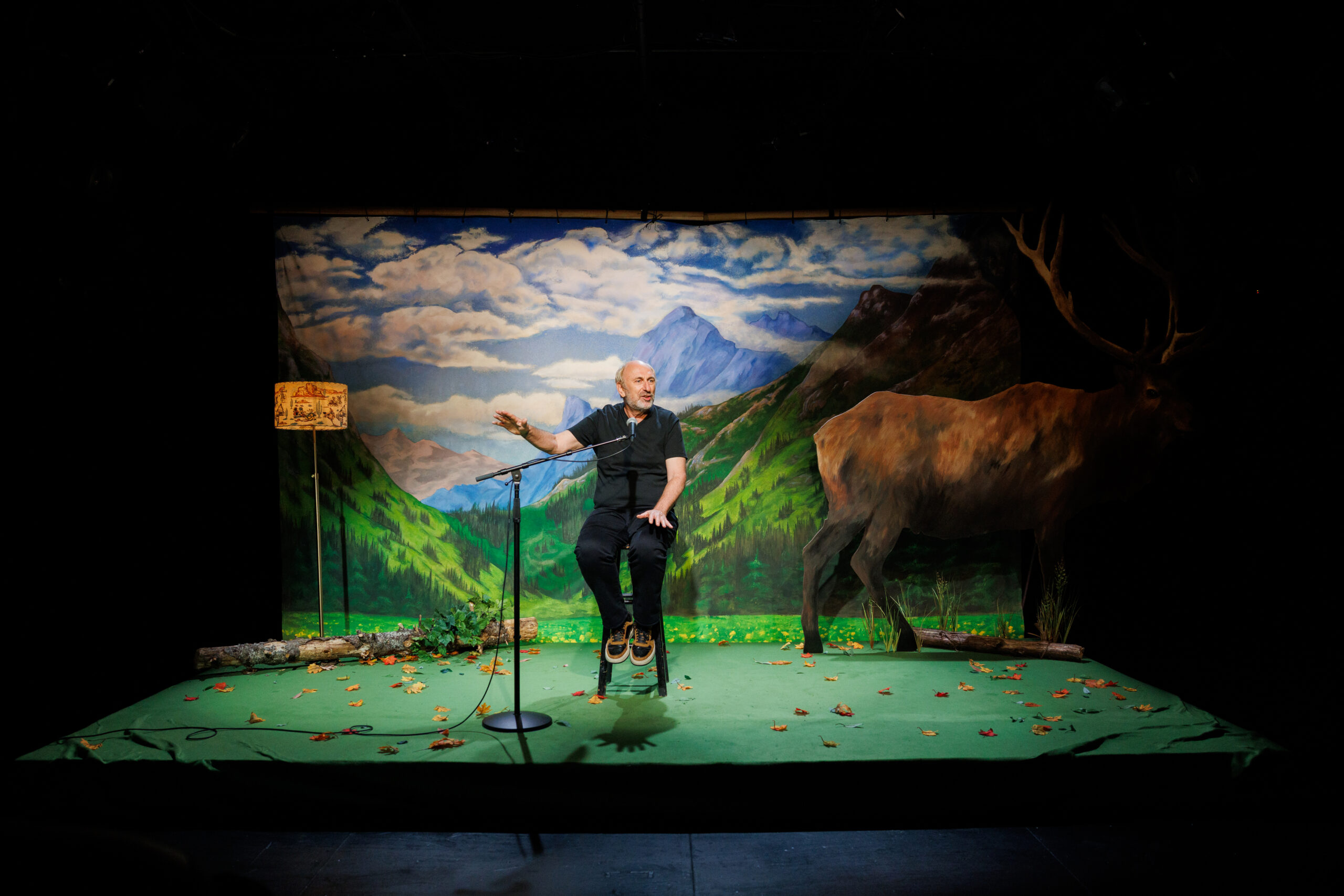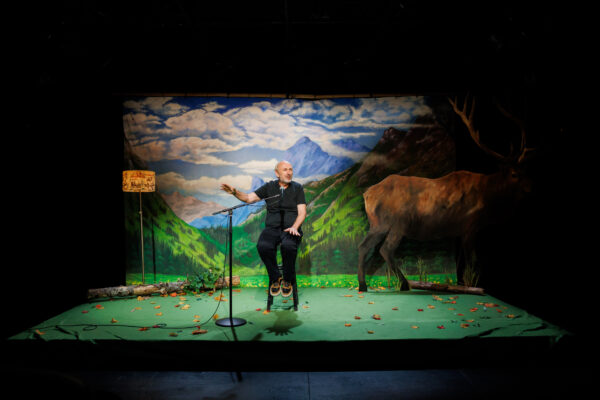
David Cale in Blue Cowboy. Photo: Maria Baranova
We’re in a one-person show sort of a moment, for perhaps obvious financial and logistical reasons–budgets are tight, and actors are the most realistic way to scale back on salaries; one actor and one director can rehearse pretty much anywhere, anytime; solo shows travel light, which makes them easy to co-produce with theaters elsewhere. But all one-person shows are not conceived alike: A lot of them, of course, fall into the more-or-less autobiographical category, performed by the writer: owing a bit to standup, a bit to The Moth: Dylan Mulvaney’s The Least Problematic Woman in the World, the work of Ryan Haddad, Josh Sharp’s Ta-Da. Some of them are monologues written by a playwright for a single actor: Jean Smart in Call Me Izzy, for example. At the most complex level, we see multi-character plays performed by a single actor–Lily Tomlin’s classic The Search for Signs of Intelligent Life in the Universe, for example, or Jen Tullock in Nothing Can Keep You From the Hand of God and Natalie Palamides in Weer, to pick two that are running in New York right now.
It’s easy, at the beginning of Blue Cowboy, to think it falls into category A: an autobiographical storytelling piece, David Cale talking about the (perhaps lightly fictionalized) life of David Cale. The narrator is a gay (or bisexual, or whatever, he says) New-York-based writer still bearing the traces of a British accent, who mostly works in the theater. He is gently arm-twisted into traveling to Idaho on a writing commission he doesn’t want to accept and finds himself staying longer than he intended, entranced by the majesty of the landscape and a series of almost mystical encounters with a herd of elk. (Colleen Murray’s set, dominated by a painted mountain scene that proves surprisingly suggestive of different weather conditions and times of day under Mextly Couzin’s lights–and the elk, facing offstage, is equally effective.)
And then he locks eyes with a stranger in a cowboy hat while viewing the local event called “the trailing of the sheep,” and the two start to build a relationship whose contours are charged but ambiguous. The build up from meet-cute through tentative friendship is slow enough that we start to wonder where the story’s going–until the connection takes a sharp turn into hot sex, and suddenly the piece is about a cowboy grappling with his sexuality at the age of 40. The writer remains our witness and narrator, but the cowboy’s journey is the story of the play.
Cale did have a writer’s residency in Sun Valley, Idaho; he did witness there the trailing of the sheep, the event at which the meet-cute eye contact happens between writer and cowboy. But—while you won’t necessarily know this unless you read the script—the character is named Andrew, not David. He’s a little younger than Cale; he’s a writer, not also an actor; he’s got an uptalk habit that you almost don’t realize is acting until you hear Cale switch gears to play the cowboy, Will. (According to an article about an earlier presentation of the piece in an upstate New York local paper The New Pine Plains Herald, Cale originally intended the show to be performed by another actor, but Les Waters would only agree to direct it if Cale performed it.)
And it’s when Will (along with his dog, Shelley, who will become a third key character here) enters the piece that we start to realize that we’re in category C: this is a multi-character play, albeit seen through the eyes of a single narrator. (A few other characters pop up for a scene here and there, and the amount Cale can do to quickly sketch these minor characters with facial expressions and light vocal shifts is noteworthy, but it’s mostly Andrew and Will.) It’s an unusually specific and subtle acting exercise–the delivery of Will’s lines and particularly his facial expressions, without ever actually slipping into Will’s consciousness; there’s one particular exchange when Will and Andrew first connect that we see entirely through facial expressions, having to deduce what’s going on behind them. It’s a long, patient moment to demand an audience focus entirely on an actor’s face, and the deliberate pacing is a credit to both Cale and director Les Waters. (I confess that I often find Waters’s work self-consciously stagey, but he’s doing something subtler here.)
Will is a dyed-in-the-wool cowboy: ranch hand, former bucking bronco rider, wears a black cowboy hat everywhere. But from the beginning he’s also a little more sensitive or emotionally available than your stereotypical cowboy, and Cale the writer is constantly toying with the (East Coast theatergoing) audience’s expectations on that front. Will not only eats but loves hummus, for example; he pronounces “Buttigieg” with more confidence than I can. In a just-past-post pandemic moment, he invites Andrew to a movie and cheerfully shows up wearing a mask. He asks Andrew for book recommendations; he unabashedly says his dog is his heart.
But coming out is another thing entirely for an Idaho cowboy. Will and Andrew’s affair is a push-and-pull, sexually alive and tender on the one hand (and the descriptions get quite explicit, sometimes hilariously so), marked by Will’s frequent attempts to pull away on the other. When they run into Will’s colleagues or acquaintances, he says that Andrew has hired him as a sort of tour guide/chauffeur (Andrew doesn’t know how to drive, so he’s getting around Ketchum, Idaho, on an old bicycle that came with the vacation home)–a step back into the closet that Andrew is unwilling to take.
The tension comes to a head when–shortly after seeing some of Andrew’s work and realizing Andrew is writing about him–Will dashes off abruptly to help a friend in an emergency, leaving Shelley with Andrew. From being a tentative, tender love story, the play suddenly switches gears into being a mystery, opening questions that Cale will not answer for us. As Andrew is suddenly confronted with how little he knew about Will–not even his last name–we, too, realize that as vivid as Will was for us, we only ever saw Cale drawing Will through Andrew’s eyes; playing Will, but only as Andrew knows him. We heard what Will was saying but we never knew what he was thinking. And neither, it seems, did Andrew. Andrew is left with a good story–and a dog–but we’re left uncertain whether Blue Cowboy is a quirky romcom or a tragedy.

